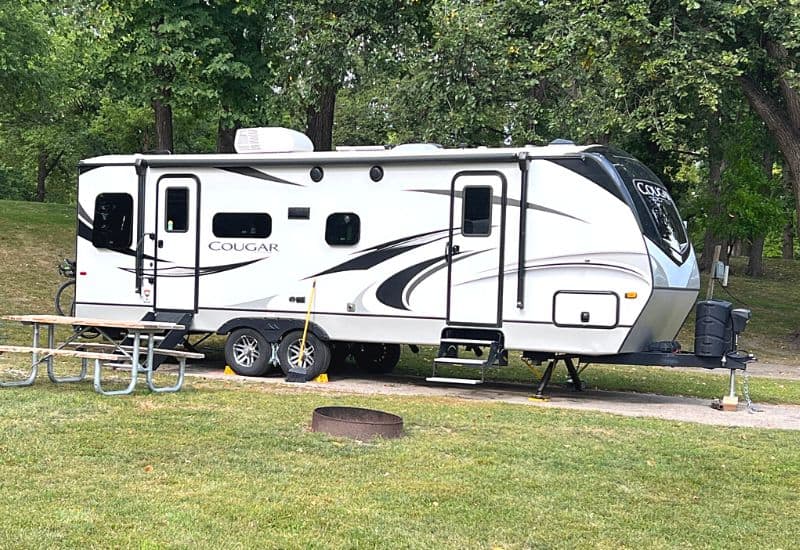If you’re like me, your travel trailer isn’t just a vehicle — it’s a home away from home.
But how long can we expect these rolling homes to last?
You might have heard that the average lifespan of a travel trailer is only 10 years.
Does this surprise or concern you?
Before you start inspecting your rig for signs of aging, in this blog post we’ll dig into why it’s estimated that travel trailers only last 10 years, why you don’t need to worry, and what you can do to ensure your trailer lasts for more than 10 years.
We’ll also highlight several campers known for lasting well beyond 10 years, including some commonly passed down from generation to generation.
1. Exposure to the Elements
One of the biggest impacts on the life of a travel trailer is its exposure to the elements.
Environmental factors like the sun and rain degrade the components and materials of a trailer over time.
So, it’s essential to understand how these elements affect your travel trailer.
Sun Exposure
The sun and its ultraviolet (UV) rays are among the most damaging environmental elements a travel trailer will face.
UV rays can damage and degrade many components on the outside of your trailer, including rubber roofs, caulking, tires, plastics, paint, and decals.
In fact, the sun’s harmful rays and the heat they produce can even weaken structural components over time.
Rain and Moisture
Like the sun, rain and moisture are other major factors that can affect your trailer’s longevity.
Water intrusion—whether from leaks in the roof or windows—can result in problems ranging from humidity and mildew issues to serious structural damage.
This includes everything from rotting wood to every RV owner’s worst nightmare: delamination.
What makes it even worse though is that RV water damage is often insidious, going unnoticed until significant harm has been done.
Hail
Hail can also have a substantial impact on a travel trailer’s life expectancy.
Larger hail can severely damage a travel trailer, causing dents, roof damage, cracked glass, and damage to solar panels and other roof accessories.
Wind
While wind may not seem like a major concern, it can cause significant wear and tear over time, and even major damage.
Persistent wind can loosen exterior components, while strong wind can lead to awning or exterior siding damage.
In extreme cases, wind can cause debris impacts and even flip the trailer over.
Cold and Snow
Even if you don’t plan on doing any cold-weather camping, freeze-and-thaw cycles can have a big impact on your travel trailer’s materials.
These cycles cause materials to expand and contract over time, which can lead to cracks or breaks and reduced functionality.
In addition, failing to properly winterize a travel trailer before the exterior temperature drops below freezing can result in all kinds of damage to your RV’s plumbing system.
Also, excessive snow accumulation on a travel trailer’s roof adds extensive weight, not only to the trailer’s roof but also to the framing that supports it.
Which can compromise the roof and or the RV’s structure over time.
2. Build Quality
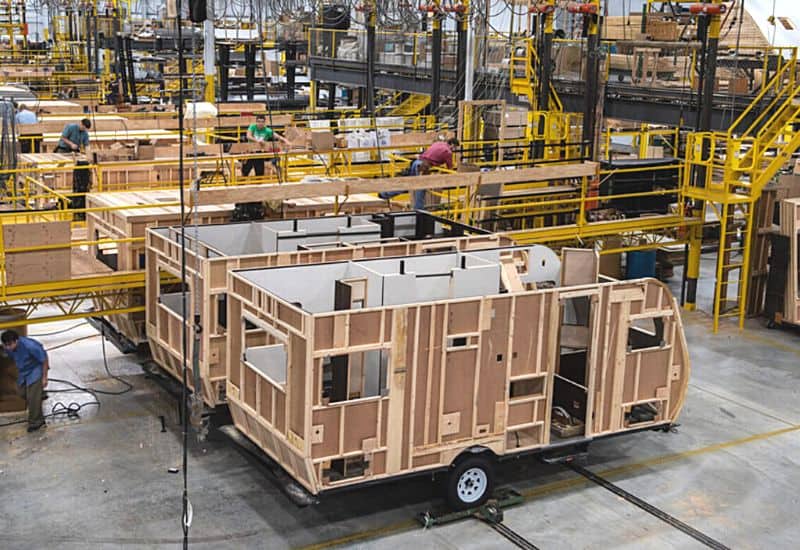
Build quality is another significant factor that can impact the lifespan of a travel trailer, explaining why, in some cases, they may only last for 10 years.
As RV manufacturers, except for a few stand-out brands, generally produce travel trailers with cost-effectiveness in mind.
Leading them to adopt an assembly line process where efficiency and speed are the name of the game.
As a result, the construction techniques and materials used may not always be of the highest quality or the most durable, which can result in premature wear and tear, shortening the trailer’s life.
In fairness to the RV manufacturers though, they often use less durable construction techniques and materials to keep the cost and weight of the trailer down.
As RV construction is always a compromise between durability, quality, cost, and weight.
3. Home On Wheels
Travel trailers are essentially homes on wheels, meaning they must withstand the rigors of the road.
This can include everything from driving down the highway at 55 miles an hour to navigating a rough dirt road to contending with the occasional pothole or speed bump.
And while they are built to withstand these conditions, the constant motion and vibrations of the road do take their toll.
As travel trailer frames, walls, and other structural components can be significantly stressed during travel, leading to potential weakening over time.
In addition, the motion and vibrations from the road can also cause components to shift, bolts to loosen, and joints to wear, which all contribute to a travel trailer’s shorter lifespan.
4. Lack of Maintenance
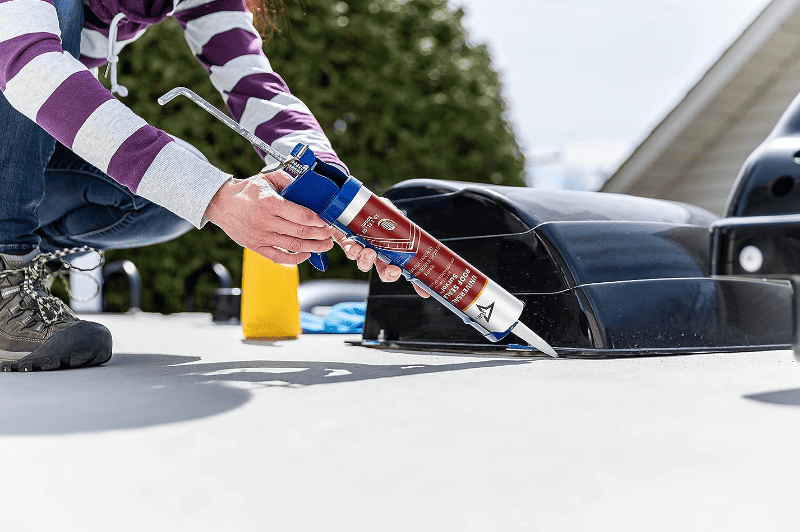
One of the most significant, yet preventable, factors that shortens the lifespan of a travel trailer is neglecting maintenance.
As RV maintenance is vital for the longevity of a travel trailer, due to the unique challenges it faces, such as constant movement, vibrations, and exposure to the elements.
Unlike traditional homes, which often have a set maintenance schedule, travel trailers frequently miss out on consistent care, significantly impacting their lifespan.
Another contributor to reduced maintenance and, consequently, a shortened life, is infrequent use.
As it’s not uncommon for a travel trailer to sit for 3 to 6 months in the off-season, causing an “out of sight, out of mind” mentality, which can lead to all sorts of issues.
Including not only a lack of maintenance but also the skipping of routine inspections, which can cause little problems to turn into big ones.
For example, if an RV owner doesn’t routinely inspect the roof of the travel trailer, he or she may not notice the small crack in its caulking, leading to minor water damage at first and then major water damage over time.
5. Improper Long Term Storage
This means that for the vast majority of the time, travel trailers are in storage.
Because of this, it’s essential to store the camper correctly.
Proper storage not only ensures the trailer remains in good condition but also can significantly extend its lifespan.
Essential storage practices include thoroughly cleaning the RV, choosing a suitable location, emptying the tanks, winterizing the camper, covering the RV, and covering the RV tires. (For a complete long-term RV storage checklist see below.)
Neglecting these steps can lead to various issues like UV damage, mechanical problems, water leaks, mold, and even vermin infestation, all of which can drastically reduce the RV’s lifespan.
6. Economic Factors
Another factor that often shortens the life of a travel trailer is economic factors, which can take many forms.
One of the biggest though is the rising cost of maintenance over time, especially as it correlates to the value of the trailer.
Because while an older camper will always cost more to maintain, the compounding issue is that it makes less sense to perform repairs over time as the trailer gets older and its value decreases.
For example, if the AC goes out on the travel trailer and needs to be replaced, which costs around $2,500 on average, it makes less economic sense to replace it, if the camper is worth less than $10,000.
Another economic reason why travel trailers often only have a lifespan of around 10 years is due to financing constraints.
As lenders will typically not loan money on older trailers, often capping finance options to those that are less than 10 years old.
Because of this, older trailers become significantly less valuable, when they hit the 10-year mark, since fewer people are willing or able to buy them without financing, leading to less demand.
This reduced demand then creates a cycle where older trailers are less likely to be maintained or upgraded, limiting their functional lifespan.
7. Technology and Functional Obsolescence

Even if an older travel trailer is structurally sound, it becomes more outdated in terms of technology and function as it ages.
Reducing the travel trailer’s usefulness over time and shortening its life.
As newer travel trailers offer more advanced construction and materials, like Azdel, as well as better insulation and better handling on the road.
Plus, they also offer substantial upgrades in technology like solar panels, lithium batteries, USB ports, smart home technology, and wireless connectivity.
8. Perception and Market Value
Travel trailers older than 10 years often face a perception issue, as many RV enthusiasts believe trailers of this age are too old to be reliable.
As a result, they opt to sell or trade them in for newer models.
This preference for newer models can make older ones seem less appealing, potentially decreasing their value and perceived lifespan.
Ironically, many travel trailers that are over 10 years old still have many reliable years ahead, especially if they’ve been well cared for.
In fact, there are certain travel trailer brands known for their 10-plus-year longevity. (To see which brands, see below.)
9. RV Regulations and Compliance Issues
RV regulations and standards, like everything else, evolve over time due to technological advancements, environmental concerns, safety issues, and consumer demands.
Because of this, as these regulations change, older travel trailers, especially those over 10 years old, often no longer comply, leading them to gradually become obsolete.
To better understand how these regulatory shifts impact the relevancy of a travel trailer, let’s examine the main categories individually.
Safety Standards
With advancements in safety technology come new regulations that older models may not adhere to.
For instance, newer travel trailers typically incorporate enhanced towing safety features, are equipped with backup cameras, and have modern electrical wiring—features often missing in older models.
Environmental Regulations
Stricter environmental rules can influence the design and production of travel trailers.
Modern models tend to be lighter with better aerodynamics for increased fuel efficiency.
They also frequently have more efficient water and electrical systems, harness renewable energy sources like solar power, and use environmentally friendly building materials.
Road Restrictions
Updated road usage rules can also make older travel trailers non-compliant.
These changes can introduce limitations on vehicle length or weight, affecting their suitability for certain roads or bridges.
How to Ensure Your Travel Trailer Lasts Longer than 10 Years
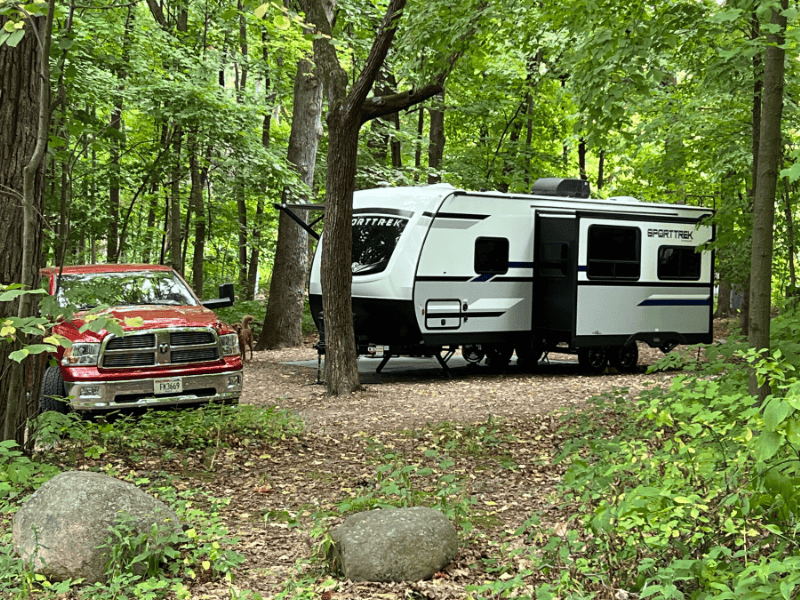
Even though travel trailers, on average, have a lifespan of about 10 years, it doesn’t mean they can’t last longer—especially if they’re well-maintained.
In fact, quality travel trailers that are well cared for can easily last for 20 years or more.
If you want to ensure your travel trailer lasts for two decades though, there are some best practices you need to follow.
We’ve categorized these recommendations into five main areas including choosing the right travel trailer, conducting regular inspections, performing routine RV maintenance, ensuring proper long-term storage, and following general best practices.
Choosing the Right RV
To ensure your travel trailer lasts for more than 10 years, it’s crucial to start with a solid foundation.
And the best way to do this is to buy a quality well-built travel trailer, following the tips below.
- Opt for a reputable RV brand. Some top-tier options include Airstream, Forest River, Winnebago, Jayco, Grand Design, and Keystone.
- Seek out travel trailers known for premium construction and materials. Look for features such as purpose-built heavy-duty frames, enhanced suspensions, dual axles, Azdel construction, fiberglass roofs, high-quality insulation, and sealed underbellies.
- Choose a travel trailer with a long track record with lots of positive reviews.
- Look for a travel trailer that offers a comprehensive warranty. RV manufacturers with the best warranties include Jayco, Airstream, Winnebago, and Fleetwood.
Regular Inspections
One of the best measures you can take to extend the life of your travel trailer is to perform regular inspections of the RV.
This not only keeps you updated about the RV’s current state but also ensures that minor issues don’t escalate into major problems.
Here’s a checklist of general RV inspections to regularly perform on your travel trailer:
- Inspect the roof at least twice a year for any cracks or damage.
- Check seals around windows, doors, and exterior joints twice a year.
- Monitor tire pressure and condition consistently to prevent blowouts and uneven wear.
- Before each camping season, inspect the condition of the air conditioner, furnace, appliances, and water heater.
- Continuously look out for signs of rodent or insect infestations and take action if necessary.
- Regularly test smoke, carbon monoxide, and propane detectors, replacing batteries when needed. Remember to note their expiration dates. Generally, it’s advised to replace smoke detectors every 5 years and carbon monoxide detectors every 5 to 7 years.
Routine RV Maintenance
As mentioned earlier, neglecting routine maintenance is a major factor that can shorten the life of an RV.
To ensure your travel trailer lasts beyond a decade, it’s essential to carry out the following routine maintenance tasks:
- Lubricate moving parts like hitch mechanisms and slide-outs at least twice a year.
- Apply outdoor caulking where required, especially if the current caulking is cracked, damaged, or absent.
- Annually treat all exterior seams and joints to prevent water leaks.
- Clean the roof and remove any debris at least twice a year.
- Opt for RV-specific cleaning products to prevent damage to interior and exterior surfaces.
- Before each camping season, clean the air conditioner filters.
- At least once a year, flush out the water heater to get rid of sediment.
- Clean awnings annually with an RV awning cleaner, and lubricate as needed.
Proper Long-Term Storage
The average RV spends most of its life in long-term storage.
Because of this, proper long-term storage is crucial for the longevity of your travel trailer, which can be accomplished by following the below best practices.
- Winterize your trailer before it’s exposed to freezing temperatures.
- Select a level, dry, and secure parking spot.
- If your budget allows, opt for covered parking for better protection from the elements.
- Try to avoid extreme temperatures, which can be tough on both the interior and exterior.
- Empty the trailer’s contents.
- Empty and clean the holding tanks.
- Run the generator for at least 30 minutes every month, even when not in use, to keep it in working order.
- Regularly air out the trailer to minimize moisture and odors.
- Use a dehumidifier or moisture absorber, like DampRid, to prevent mold and mildew.
- Promptly remove snow or debris from the roof to prevent potential damage.
- Shield the tires with RV tire covers.
- Consider covering the trailer in a breathable high-quality RV cover, after a thorough wash.
General Best Practices
The following best practices will help you maintain your travel trailer in optimal condition and extend its lifespan:
- Never exceed the manufacturer’s recommended weight limits for your travel trailer.
- Always use a water pressure regulator when connecting to a water supply.
- Avoid overloading the trailer, as excessive weight can stress the axles and frame.
- Utilize a weight distribution hitch for even load distribution and reduced frame wear.
- Avoid harsh terrains like rocky roads, which can strain the suspension and undercarriage.
- Try to avoid extreme temperatures, as they can be hard on both the interior and exterior.
- Place entry mats to prevent dirt and grime from embedding in carpets or flooring.
- Don’t use your travel trailer as a storage shed between trips.
- Use RV protectants designed for RVs to keep everything looking like new.
3 Travel Trailers That Often Last Beyond a Decade
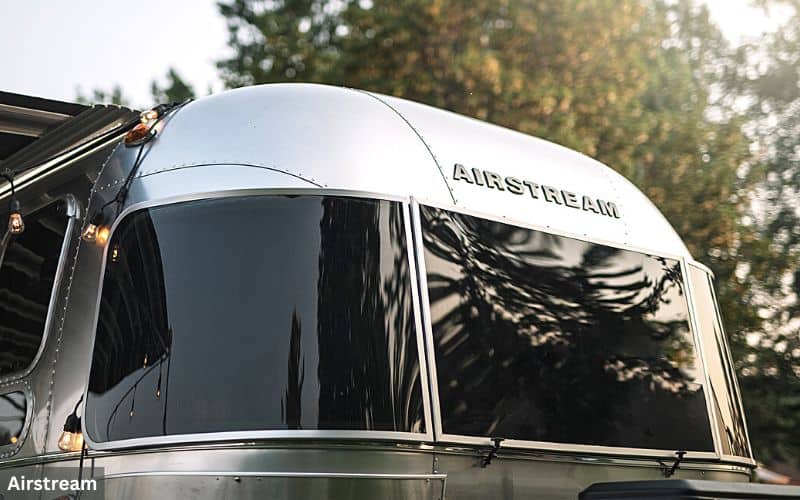
As promised, to close out this blog post, we’ve highlighted several travel trailers that consistently last longer than 10 years.
Starting with the iconic Airstream travel trailer.
Airstream Travel Trailers
One of the most recognizable and well-respected campers known to last beyond a decade is the iconic Airstream travel trailer.
A well-cared-for Airstream can easily last for 20 years and beyond, thanks to its all-aluminum exterior, premium construction, rigorous standards, and high attention to detail.
In fact, it’s not uncommon for Airstreams to be passed down from one generation to the next.
This enhanced durability and longevity comes at a cost though, as Airstreams rank among the most expensive travel trailers on the market, with some models exceeding $100,000.
But if there’s a silver lining to this hefty price tag, it’s the impressive value retention of these trailers, as Airstreams consistently hold their value better than competitors.
Popular Airstream Models:
To see even more popular models, check out our blog post titled “The 8 Best Selling Airstream Models Available Today“.
Fiberglass Travel Trailers
After Airstreams, fiberglass travel trailers rank as some of the longest-lasting campers, often lasting for over 20 years.
Thanks in large part to their distinctive design and construction.
Fiberglass campers are built using top and bottom fiberglass shells that are joined in the middle, which provide several benefits in terms of durability and longevity.
These advantages include better protection from the elements, a reduced risk of leaks, enhanced UV protection, and excellent resistance to corrosion.
In addition, fiberglass campers are also more lightweight and aerodynamic compared to standard travel trailers.
Allowing a wider range of vehicles, like the Honda Pilot, the Dodge Durango, and the Toyota Tacoma to tow them.
Like Airstreams, fiberglass campers also hold their value really well.
In contrast to Airstreams though, they are much more affordable, often priced under $30,000.
Making them an attractive option for those seeking Airstream-like benefits without the hefty price tag.
Popular Fiberglass Models:
Premium Travel Trailers
Rounding out our list of the longest-lasting campers are premium travel trailers.
These travel trailers owe their longevity to their best-in-class RV construction and materials.
This higher-end construction comes at a cost though, as premium trailers are often two or three times the price of entry-level ones.
Popular Premium Models:
- Lance Travel Trailer
- Jayco Jay Flight
- Grand Design Imagine
Final Thoughts on How Long a Travel Trailer Lasts
While general industry guidance suggests that travel trailers only last 10 years, remember that this is just an estimate.
The actual lifespan of a travel trailer can vary widely based on several factors.
These include exposure to the elements, build quality, how well it’s maintained, and the conditions in which it’s stored.
To ensure your travel trailer stands the test of time though, there are several best practices you need to follow.
Starting with the purchase of the trailer.
As it’s important to choose a high-quality well-built travel trailer, to lay a good foundation.
This just lays the foundation though, as it’s also important to carry out regular inspections, follow a routine maintenance schedule, and adhere to proper storage practices.
With these best practices in place though, there’s every reason to believe your travel trailer can serve you for well beyond a decade.
Recent Posts
Are you ready to transform your pop-up camper into a cozy and stylish home away from home? Pop-ups offer a great blend of affordability, flexibility, and convenience. However, older models often...
Picture this: you're parked at a scenic campsite, the great outdoors stretching out before you. You step outside your RV, ready to soak in the fresh air and beautiful views. But wait - something's...

